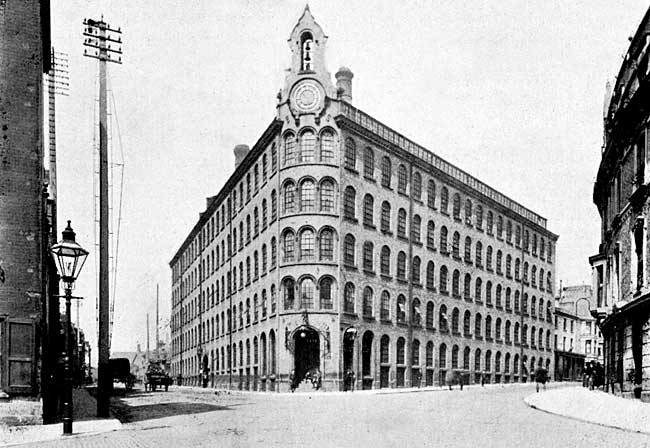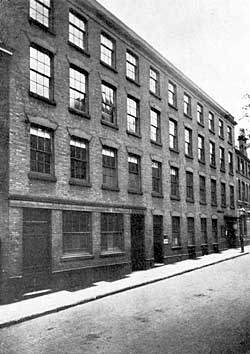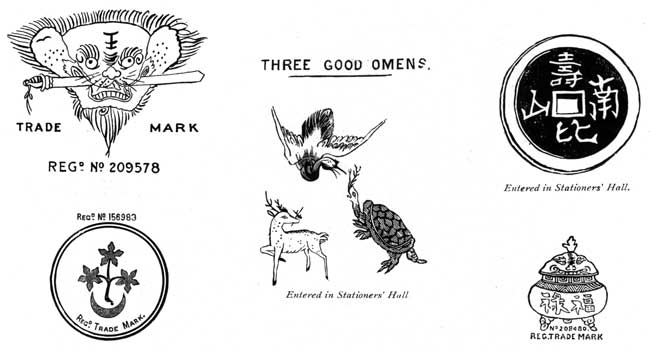< Previous | Contents | Next >
Messrs. J. & R. MORLEY,
Manufacturers and Warehousemen, 18 Wood Street, LONDON, E.C., and Fletchergate, NOTTINGHAM.
Factories :-MANVERS STREET, HANDEL STREET, and DAYBROOK, NOTTINGHAM; and at HEANOR, LOUGHBOROUGH, SUTTON-IN ASHFIELD, LEICESTER, LONDON, and GRENOBLE (France).
AN event fraught with immense future possibilities to the industrial development of Nottingham was the invention by the Rev. William Lee, of the neighbouring village of Calverton, of the stocking knitting machine, which, introduced by him a little more than three centuries ago, laid the foundation of the important trade, now a principal staple of the city's manufacture. The subsequent progress of the hosiery industry is intimately identified with the name of the eminent house of J. and R. Morley, whose history is contemporary with the most important improvements effected in the trade, and whose magnificently organised enterprise, with its numerous ramifications at home and abroad, occupies a position unique in the annals of British manufactures. The business dates its origin to over a century ago when it was founded on a comparatively modest scale by the firm of Morley, Wilson and Morley. Some years afterwards the concern passed into the possession of the two brothers, John and Richard Morley, and at that time the present title of the firm was adopted. Mr. John Morley about tnis time commenced the London business, leaving his brother in charge of the manufacturing departments. The latter died in 1855, after a busy and active life of usefulness, both in a private and public capacity, having been thrice elected mayor of Nottingham, and for many years magistrate for the county, while his benefactions were both numerous and munificent in connection with local charities and other movements having for an object the well-being of the inhabitants of the city. After the death of this gentleman his place in the firm was taken by Mr. Arthur Morley, who died suddenly in 1860. One of the best remembered members of the family is the late Mr. Samuel Morley, for many years member for Bristol, whose statue, erected by the citizens of Nottingham, stands at the top of Market Street, as a permanent memorial of their grateful remembrance. After the death of Mr. Samuel Morley Mr. Hill became the managing partner at Nottingham, and a few years ago he was joined by Mr. Small and Mr. Goodall.
With the introduction of steam-power machinery in the trade in 1860, was accomplished a complete revolution in hosiery manufacture, hitherto effected by hand looms, and among the first to adopt the improvement were Messrs. Morley, and six years later the firm acquired the large factory in Manvers Street, which was fully equipped with new plant of this type. In 187l, to meet the requirements of their constantly increasing business the firm purchased from Messrs. Lee and Gee, the Handel Street factory, and the works at Daybrook were afterwards acquired. To these already extensive premises were added in 1887, the commodious works of the Midland Hosiery Co., at Sutton-in-Ashfield, Nottinghamshire, besides which there are large factories at Heanor, Loughborough, Leicester, London, and Grenoble (France). The head-quarters of the manufacturing departments of the firm in Fletchergate comprise an immense block, or rather a series of blocks, of large buildings, specially designed for the convenient accommodation of the warehouse, packing and dispatching departments. The premises throughout are lofty, well-lighted, and completely arranged for the work of distribution, the goods received here from the various factories being prepared for forwarding to their destination, in either the home or export markets. In the shipping department at the time of our representative's visit were large consignments of goods ready for forwarding, the cases bearing the names of well-known centres in various parts of the world, indicating the almost illimitable scope of the firm's export trade. Considerable extensions of the Fletchergate warehouse have recently been effected, adjoining property having been purchased, giving a total frontage of over 306 feet.
The London establishment, centrally situated in Wood Street, E.C., is a handsome and imposing building of five storeys elevation and basement, covering a large area of land in the heart of the city, with extensive frontages to that and the adjoining thoroughfare. The firm have also an immense factory of seven floors in Golden Lane where shirts, ties and umbrellas are manufactured, the premises being completely equipped with modern and improved appliances for facilitating work in these departments. The firm at their various premises give employment to upwards of 4,000 hands.
THOMAS A. HILL,
Hosiery Manufacturer, Castle Gate, NOTTINGHAM.

The Factory.
PERHAPS at no previous period of its history has the hosiery trade experienced a more rapid and extensive development than within the past few years, which have witnessed the remarkable stimulus of an almost general adoption of knitted underwear for both sexes and nearly every class of the community. The superiority of this form of clothing from the hygienic point of view has been amply demonstrated by the testimony of the most eminent members of the medical profession and sanitarians, and is now endorsed by the obiter dictum of that equally powerful authority, the autocracy of fashion, as expressed in the dainty and elegant specimens of underwear turned out by such leading firms as that to whom this notice is respectfully dedicated. This—one of the oldest houses in the hosiery manufacturing trade—was originally founded by the late Mr. Haywood Butler over half a century ago, who commenced the business of a hosiery manufacturer in Back Lane, Nottingham. In 1858 the firm assumed the style of Messrs. Butler and Co., Hosiery Manufacturers, and at that time acquired premises in Castle Gate, which offered more adequate accommodation for their operations. In 1859 Mr. Richard Earwaker became a partner in the firm and by his energy and enterprise largely increased the business and extended the connection already established by his predecessor. The concern was then continued in the name of R. Earwaker and Co., and in 1883 Mr. Thomas A. Hill joined the firm, and on the dissolution of partnership in 1891 took over the entire control, trading in the style now identified with his well known house. Situated in one of the oldest streets in the town, which still retains many traces of its former occupation as the residence of the well-to-do inhabitants of old Nottingham, the warehouse is centrally placed in the city, and comprises a well-appointed suite of private and general offices on the first floor with conveniently arranged stock rooms and spacious accommodation for the work of the packing and dispatch departments. Here we had an opportunity of inspecting a large assortment of samples of Mr. Hill's manufactures in ladies' and gentlemen's underwear in cashmere, merino, silk, woollen and cotton materials, many of the former conveying an idea of the tasteful perfection of design and fabrication and finish attained in the up-to-date styles of combinations etc., presented in this, department, the patterns being in every respect worthy of the time-honoured reputation of the house both in novelty, originality, and utility of make.

Warehouse in Castle Gate.
The factory, occupying an extensive area of ground between Wollaton and Goldsmith Streets, with an extensive frontage is a large, lofty and substantially constructed building specially designed for this particular manufacturing industry, and arranged and organized throughout on the most efficient and systematic lines for facilitating the output of goods in the various departments. The principal apartments are two immense rooms measuring 300 feet in length, and each lighted by thirty-five windows ranged on either side giving commodious, well ventilated, and spacious accommodation for the work in progress. The mechanical equipment is of the most complete modern order, embodying all the latest improvements for economising labour and securing the maximum of production of the several classes of goods which form the specialities of the firm's manufacture. The plant includes a full outfit of hosiery machines designed on Cotton's patented improvements, rib frames, rotary frames, circular and fleecy web frames, circular body and webbing frames with the requisite complement of winding machines, motive force for which is supplied by a powerful steam engine and boiler attached, erected on another part of the premises. Adequate precautions are taken against fire, each landing and workroom being provided with hydrants, hose and other appliances ready for immediate application in case of an outbreak. A certain number of the employes are also told off and regularly drilled in the use of the fire extinguishing apparatus, whose services are always available in any contingency that may occur. On the fourth floor are the manager's office, and a telephone room in direct communication with the warehouse in Castle Gate, by which orders can be transmitted without delay. There are also large store rooms for finished goods, and the department where work is given out and received, to be subsequently subjected to a rigid examination by an experienced overlooker whose duty it is to inspect every article before finally passing the goods as finished. The trade is both home and export, the manufactures of the house finding a ready market among the large wholesale buyers in London and the provinces, and through the agency of shippers being consigned to all parts of the world.

